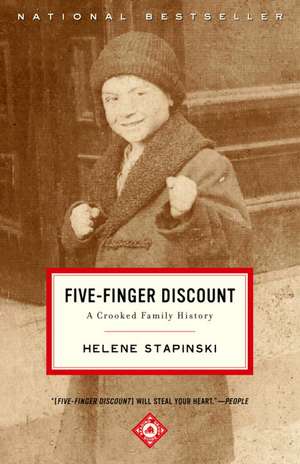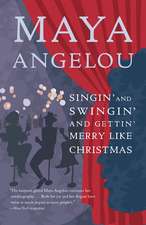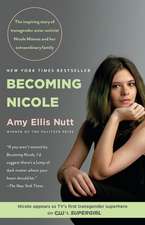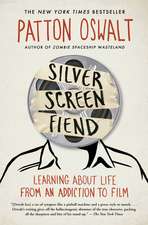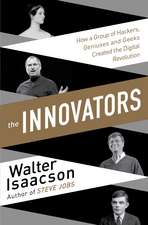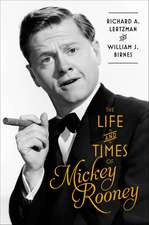Five-Finger Discount: A Crooked Family History
Autor Helene Stapinskien Limba Engleză Paperback – 28 feb 2002
Preț: 120.59 lei
Nou
Puncte Express: 181
Preț estimativ în valută:
23.08€ • 24.00$ • 19.05£
23.08€ • 24.00$ • 19.05£
Carte disponibilă
Livrare economică 25 martie-08 aprilie
Preluare comenzi: 021 569.72.76
Specificații
ISBN-13: 9780375758706
ISBN-10: 0375758704
Pagini: 272
Dimensiuni: 133 x 203 x 15 mm
Greutate: 0.2 kg
Editura: Random House Trade
ISBN-10: 0375758704
Pagini: 272
Dimensiuni: 133 x 203 x 15 mm
Greutate: 0.2 kg
Editura: Random House Trade
Recenzii
“[Five-Finger Discount] will steal your heart.”
—People
“By turns hilarious and alarming, uproarious and depressing, [stapinski’s] book reads on the surface like something by Damon Runyon and Elmore Leonard, with a dark undertow of real-life pain and disillusion.”
—Michiko Kakutani, The New York Times
“It’s a brilliant book, a darling book. It is the blessedly modest chronicle of a magical consciousness that seems to have been born pulling diamonds out of the muck, hearing angels’ voices in the fiercest thunder....I adored every word of this wondrous book. Get it. Read it.”
—Michael Pakenham, Baltimore Sun
“In the tradition of...Rita Mae Brown and Amy Tan, Ms. Stapinski is an exciting writer, unabashedly candid, and at the same time unashamedly self-contained. Five-Finger Discount is a must-read.”
—Victoria Gotti, The New York Observer
“What [Frank] McCourt did for Limerick, Ireland, Helene Stapinski does for Jersey City.”
—Newark Sunday Star-Ledger
“Hugely entertaining.”
—London Sunday Times
—People
“By turns hilarious and alarming, uproarious and depressing, [stapinski’s] book reads on the surface like something by Damon Runyon and Elmore Leonard, with a dark undertow of real-life pain and disillusion.”
—Michiko Kakutani, The New York Times
“It’s a brilliant book, a darling book. It is the blessedly modest chronicle of a magical consciousness that seems to have been born pulling diamonds out of the muck, hearing angels’ voices in the fiercest thunder....I adored every word of this wondrous book. Get it. Read it.”
—Michael Pakenham, Baltimore Sun
“In the tradition of...Rita Mae Brown and Amy Tan, Ms. Stapinski is an exciting writer, unabashedly candid, and at the same time unashamedly self-contained. Five-Finger Discount is a must-read.”
—Victoria Gotti, The New York Observer
“What [Frank] McCourt did for Limerick, Ireland, Helene Stapinski does for Jersey City.”
—Newark Sunday Star-Ledger
“Hugely entertaining.”
—London Sunday Times
Notă biografică
Helene Stapinski began her career at her hometown newspaper, The Jersey Journal, and since then has written for The New York Times, New York magazine, and People, among other publications. She received her B.A. in journalism from New York University in 1987 and her M.F.A. from Columbia in 1995. She lives in Brooklyn with her husband and son.
Extras
1
Majestic Memory
The night my grandfather tried to kill us, I was five years old, the age I
stopped believing in Santa Claus, started kindergarten, and made real
rather than imaginary friends.
Because Grandpa was one of two grandfathers in their family, my cousins
called him Grandpa Jerry. For me, he was simply Grandpa. I had only one.
The other--my father's father, the Polish grandpa we called Dziadzia
(pronounced Jaja)--was hit over the head during a burglary in his front
hallway seven years before I was born and died after slipping into a coma.
Everyone in Jersey City knew Grandpa "Italian Grandpa" as Beansie, because
when he was young, he stole a crate of beans from the back of a truck.
Details about his life started to bubble into my consciousness during the
summer of 1970, the year my memory kicked in full force. There were stories
about Grandpa "going away" to Trenton for murder. Being arrested for armed
robbery. Beating my mother, her sister, and her three brothers.
Grandpa was a well-known neighborhood bully and crook, though the only
stolen objects I knew of firsthand were the ones he swiped while working as
a security guard at the Jersey City Public Library and Museum in the late
1960s. The fact that Grandpa was able to get a city job as a security
guard (through an uncle, who knew a local judge, who was connected to the
mayor) says a lot about Jersey City's patronage system and general
reputation. Everybody stole. It was no big deal.
My brother inherited most of the objects Grandpa took from the library and
museum--the shiny, shellacked coins with Indian feathered heads; a
photograph of Abraham Lincoln; small, black Indian arrowheads; a set of
encyclopedias. I always wondered if Grandpa stole them book by book or had
one of his friends with a car pull up to the library and help him load them
in.
The only stolen object of Grandpa's that I possess is a dictionary, a
Webster's Seventh New Collegiate edition, which he inscribed to my sister
the year I was born: "From Grandpa. Hi Ya Paula. Year-1965." The call
numbers on the spine and the blue stamp on a back page, which reads free
public library jersey city, n.j., have been crossed out in blue indelible
marker, his attempt to legitimize the gift. Grandpa obviously had his own
interpretation of the phrase free public library.
Before I started school, my grandma Pauline baby-sat for me while my mother
worked as a clerk at the Jersey City Division of Motor Vehicles office,
three blocks away. When Grandma died in February of 1970, my mother had no
one to baby-sit, so she quit her job. Though I'm sure I missed my grandma--a
saintly woman with a halo of white hair and small, pretty hands--my world
changed for the better. I was suddenly the center of my mother's attention.
With Grandma gone, Grandpa was at the center of no one's.
Because my grandmother had stayed married to Grandpa for four decades, she
died fairly young. She was only sixty. She died on Ash Wednesday, the first
day of Lent. By then Grandma hated Grandpa so much that on her deathbed,
with the smudge of ashes on her forehead, she made my mother promise that
Grandpa wouldn't be buried on top of her when he died. She couldn't stand
the thought of his remains mingling with hers.
Majestic Memory
The night my grandfather tried to kill us, I was five years old, the age I
stopped believing in Santa Claus, started kindergarten, and made real
rather than imaginary friends.
Because Grandpa was one of two grandfathers in their family, my cousins
called him Grandpa Jerry. For me, he was simply Grandpa. I had only one.
The other--my father's father, the Polish grandpa we called Dziadzia
(pronounced Jaja)--was hit over the head during a burglary in his front
hallway seven years before I was born and died after slipping into a coma.
Everyone in Jersey City knew Grandpa "Italian Grandpa" as Beansie, because
when he was young, he stole a crate of beans from the back of a truck.
Details about his life started to bubble into my consciousness during the
summer of 1970, the year my memory kicked in full force. There were stories
about Grandpa "going away" to Trenton for murder. Being arrested for armed
robbery. Beating my mother, her sister, and her three brothers.
Grandpa was a well-known neighborhood bully and crook, though the only
stolen objects I knew of firsthand were the ones he swiped while working as
a security guard at the Jersey City Public Library and Museum in the late
1960s. The fact that Grandpa was able to get a city job as a security
guard (through an uncle, who knew a local judge, who was connected to the
mayor) says a lot about Jersey City's patronage system and general
reputation. Everybody stole. It was no big deal.
My brother inherited most of the objects Grandpa took from the library and
museum--the shiny, shellacked coins with Indian feathered heads; a
photograph of Abraham Lincoln; small, black Indian arrowheads; a set of
encyclopedias. I always wondered if Grandpa stole them book by book or had
one of his friends with a car pull up to the library and help him load them
in.
The only stolen object of Grandpa's that I possess is a dictionary, a
Webster's Seventh New Collegiate edition, which he inscribed to my sister
the year I was born: "From Grandpa. Hi Ya Paula. Year-1965." The call
numbers on the spine and the blue stamp on a back page, which reads free
public library jersey city, n.j., have been crossed out in blue indelible
marker, his attempt to legitimize the gift. Grandpa obviously had his own
interpretation of the phrase free public library.
Before I started school, my grandma Pauline baby-sat for me while my mother
worked as a clerk at the Jersey City Division of Motor Vehicles office,
three blocks away. When Grandma died in February of 1970, my mother had no
one to baby-sit, so she quit her job. Though I'm sure I missed my grandma--a
saintly woman with a halo of white hair and small, pretty hands--my world
changed for the better. I was suddenly the center of my mother's attention.
With Grandma gone, Grandpa was at the center of no one's.
Because my grandmother had stayed married to Grandpa for four decades, she
died fairly young. She was only sixty. She died on Ash Wednesday, the first
day of Lent. By then Grandma hated Grandpa so much that on her deathbed,
with the smudge of ashes on her forehead, she made my mother promise that
Grandpa wouldn't be buried on top of her when he died. She couldn't stand
the thought of his remains mingling with hers.
Descriere
With deadpan humor and obvious affection, Helene Stapinski recounts the story of her growing up in a family "as thoroughly corrupt as the Hudson County political machine that whirs behind the scenes" ("The Village Voice").
